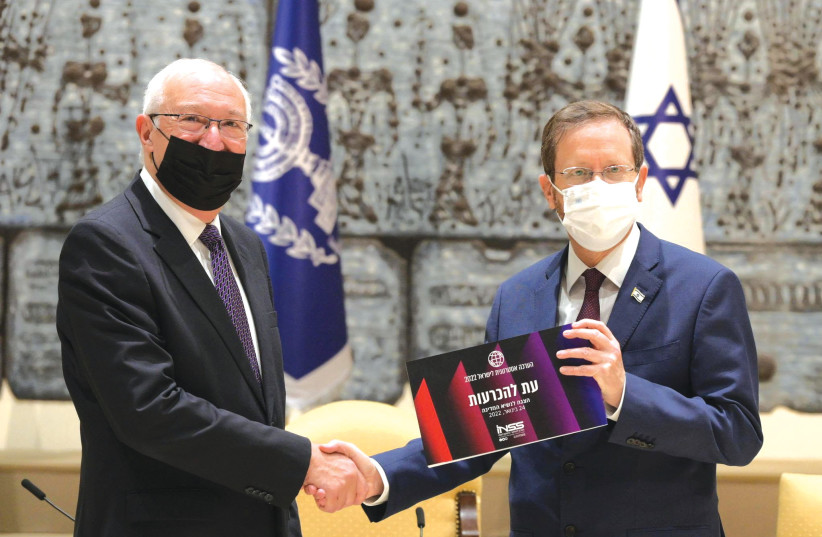Israel must take confidence-building measures in favor of America and its partners in the “chips alliance.” To avoid ambiguity in the “chips tech war” with China, says a new Institute for National Security Studies (INSS) position paper.
Authored by T.Z., a member of IDF intelligence in his private capacity (but whose name must remain classified) and by Valens senior corporate development vice president Ariel Sobelman, the report makes clear recommendations for how Jerusalem should walk the advanced technology chips tightrope competition between Washington and Beijing.
The authors discuss the pre-Biden administration trade war between the US and China as well as the impact of the COVID-19 pandemic and the Russian invasion of Ukraine last February to crystallize the need for democratic countries to separate their supply chains from unstable or undemocratic ones.
The CHIPS (Creating Helpful Incentives to Produce Semiconductors) and Science Act signed by US President Joe Biden in August 2022 “drastically changed the dynamics and norms of global technology commerce.”
It allocated $52 billion to encourage the construction of semiconductor production plants in the US, and more than $200 billion over the next decade to ensure the continued research and development that is an essential condition for success in the field of artificial intelligence and super and quantum computing abilities, INSS said.

Simultaneously, the US “unveiled a comprehensive list of restrictions on the export of chips and technology to China, aimed at preventing Beijing from developing advanced technologies” which it could use to undermine global stability.
The authors said that while all of this might seem like a naked economic move intended to secure America’s technological superiority, it is rather “part of a larger struggle over the nature of the global order, in which the United States is determined to change the course of global trade in an unprecedented way, inter alia, with the aim of preventing attacks on the values of democracy.”
NEXT, in the US National Security Strategy, published in October 2022, INSS said that Biden “highlighted the multi-dimensional competition with China and the need to stop China becoming stronger and threatening global stability, particularly in the context of advanced technology and semiconductors,” including by limiting its access to chips which are key to many of those issues.
The authors further said that “the chip industry is based on global supply chains. The chip crisis, developing as a result of geostrategic impetus, and exacerbated by the pandemic – and a variety of other independent factors such as earthquakes, fires, power outages and climate – highlighted the risk to the US when a sector” essential to national security is sensitive to shocks beyond US control.
Next, the report said that the largest manufacturers of these critical hi-tech chips are Taiwan, followed by Japan and South Korea. In turn, companies in Holland and Japan “are responsible for producing the lithography devices used in the manufacturing of advanced chips.”
Moreover, “American legislation has created a situation in which every country… is committed to a review of its partnerships and other companies in its supply chain in order to assure compliance and avoid US sanctions,” , INSS stated.
While many EU and other countries stalled on this issue for an extended period, the authors wrote, “recent weeks have witnessed the formation of collaborations and deals indicating the start of a change and the emergence of a ‘chips alliance.’”
The report noted that, “Taiwan, which relies on the United States for its security in the face of a threatened Chinese invasion, was the first to join the alliance,” highlighting that the island’s leading chip company TSMC announced the construction of two advanced chip plants in Arizona for a $40 billion investment.
Also, the report said that this month, the European Union finalized approval of the European Chips Act, which limits supply chains and promotes the construction of further manufacturing facilities on the continent.
European Law
THE EUROPEAN law “does not include trade restrictions on China, but [it] explicitly states that the EU will be part of a supply chain including the United States, Japan, South Korea, Singapore and Taiwan.” This pretty much means that Europe is also committed to the “chips alliance,” according to the report.
In addition, it noted that in recent weeks, Holland and Japan, the sites of the lithography machines that are essential to the manufacture of advanced chips, signed a joint agreement with the US to both deny China access to essential instruments and hamper its independent chip manufacturing capabilities.
INSS recommended that the Israeli government “should continue the technology dialogue launched in 2022 and initiate a discussion on technology collaboration with the US and the EU, particularly with respect to hardware and chips.”
In this context, the report said that “Israel must highlight its relative advantage in the field of research and development, particularly in the field of artificial intelligence, where Israel has an ecosystem involving industry, academia and security elements.”
Moreover, “Israel must also understand that the United States is determined to re-shape the structure of global trade in order to protect its national security and democratic values,” the authors wrote, to avoid the public threat of sanctions issued this summer by the US Commerce Department.
“The importance of the ethical component of global trade is changing,” they noted, “with technology becoming a tool for the struggle between democracies and other forms of government.”
In the geostrategic rivalry between China and the United States, which now has added an open “chips war,” the report makes it clear that Jerusalem should take Washington’s side.
